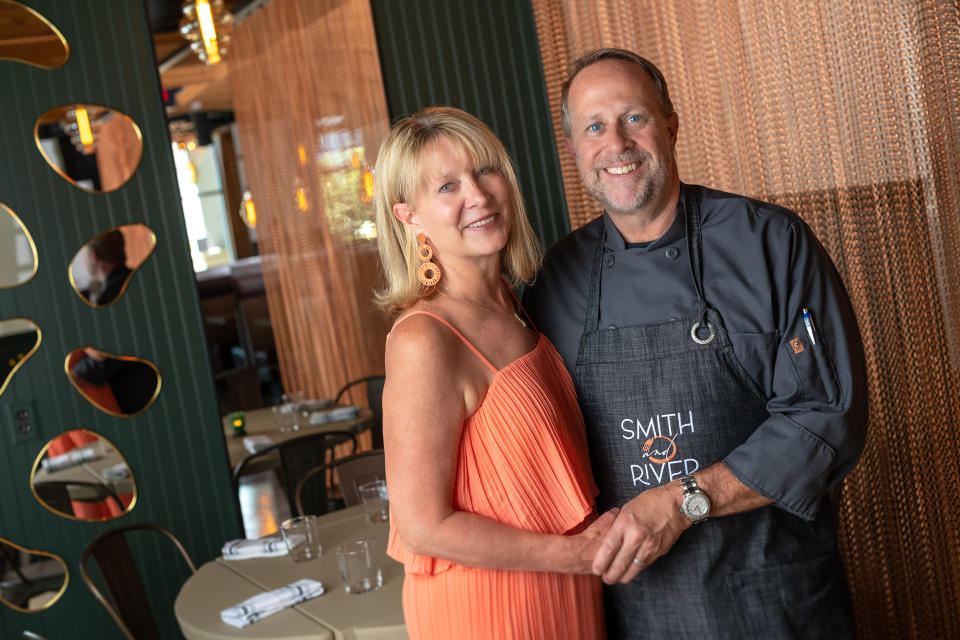I don't drink. Should I still split the bill evenly? Etiquette expert weighs in
- Oops!Something went wrong.Please try again later.
Dear Mister Manners: I have a group of friends who dine out together about once a month. We all come from different income levels, and I happen to be among the ones who doesn’t earn a large salary. Plus, I don't drink. But even if I order the cheapest item on the menu, the inevitable outcome when the meal ends is everyone handing over their credit cards and splitting the tab evenly. Is there any way I can gently tell my crew I can’t afford to be paying for their multi-course meals? I’m on a budget!
(Mealtime with Mister Manners is a weekly column that delves into a smorgasbord of dining-etiquette dilemmas. Please submit your questions at the bottom of this page.)
Can you imagine a scenario in which a group of friends goes clothing shopping and strikes a similar bargain? Friend No. 1 chooses a lovely pair of tube socks; friend No. 2 selects a frugal T-shirt; friend No. 3 settles on a cashmere sweater, a pencil skirt and a pricey pair of pumps. As this trio puts their combined selections on the counter, credit cards in-hand, friend No. 3 happily announces to the cashier: "We’re going to split this evenly."
Absurd, right? And yet, when we dine out, it often does seem that those blithely ordering more than others don’t ponder the prospective inequities of splitting a check evenly. Should Marina be paying a pro-rata share of Dan’s blue lobster when Dan had only the miso soup? Should Timothy be paying for Jack’s four margaritas when Timothy had only a club soda?
Let’s do this again … or not
The larger the group, the more challenging the dilemma can be. In a party of 10, is it reasonable to expect that someone who ordered a $40 entrée and two cocktails is taking note of the woman with only a garden salad and an iced tea at the opposite end of the table?
In other words, when the check comes, those who have ordered a good measure more than everyone else may simply be clueless about any inequity. Rest assured, it won’t escape the notice of those having to chip in $90 when their own tab came to $20.
As the rest of the table happily pronounces “That was actually more reasonable than I expected” and “We have to do this again soon,” those feeling the sting in their wallets may well be wondering if they can afford to do this again.
All for one and one for all
"I think if you go out to dinner, you just have to throw capitalism out of your head," said humorist and cultural observer Joel Stein. "It doesn't matter if you just felt like a drink or a salad. The idea of some kind of financial fairness in a group-dining situation is nonexistent. Once you’ve accepted an invitation to go out with a large group, you just have to know that you've entered a socialist space."

Perhaps best known for his 20-year run as a Gen X columnist for Time magazine, Stein is also author of the 2019 book "In Defense of Elitism." To reassure would-be readers of his intentions, the subtitle provides a clue: “Why I'm Better Than You and You're Better Than Someone Who Didn't Buy This Book.” Back at the dinner table, Stein concedes his own non-confrontational leanings may have some bearing on his tendency to not make an issue out of splitting the tab even if he is being wronged. He also sees the problem as a uniquely American one.
“We have such extreme individualism — and it’s ever-growing in this country. If you go to dinner with a bunch of Norwegians, nobody's worried about this. I could be wrong, but I kind of suspect that they don't. I imagine if you went to dinner with a large group in China, there's not a soul at the table who is thinking, 'I paid more than my fair share.'"
A fraught topic
Regardless of whether American individualism is the root cause, there is no question that footing a larger portion of what one ordered does not sit well with many diners. And yet, the very act of bringing up the topic can cause an equal and opposite firestorm. A July 2022 tweet by attorney @Parkerlawyer bemoaned her daughter’s getting stuck with an $84 split-check hit after ordering a mere $22 worth of food. The replies and retweets demonstrate the divide, from: “Leave $25 on the table, 'go to the restroom,' then find new friends,” to “If you worry about the $$ when spending time with friends, then you like your $$ more than them.”
Daughter, 23, law student, goes to dinner with friends. She orders an appetizer and 1 drink. Total $22. Friends (older, employed) order entrees, wine, and dessert. End of meal, friends say, “LET’S JUST SPLIT IT!” Daughter’s new total $84. What is the right response here? (I know)
— Lady Lawya (@Parkerlawyer) July 23, 2022
Event planner David Landgraf recalls the sticker shock he experienced when he first arrived in New York as a young adult and dined out with groups where there was consistently at least one person who would “order up,” choosing menu items noticeably more expensive than the rest of the table. And though he has since learned to handle such situations with less internal shock, he is not immune from the pang of such imbalances, recalling a recent occasion where he and a couple of friends left a reception and continued the evening at a chic boite nearby.
“Even though there had been plenty of food at the event we had just left, one of the members of the group announced he was still hungry and asked if anyone would mind if we grabbed a nibble somewhere,” he recounted. “I wasn’t very hungry, so I wound up sharing a shrimp cocktail. The person who suggested the pitstop ordered a $100 potato dish and multiple cocktails.”

By the time the check arrived, Landgraf wound up sharing not just the shrimp cocktail but an even portion of the check as well.
Taking responsibility — on both sides
“If someone at a table is overspending everyone else, they should be presented with the bill,” said Colin Smith, chef and co-owner of Smith and River restaurant in Reno, Nevada. “Whomever orders the wine, buys the wine.” It’s a philosophy he not only preaches but practices, too: “If I was ordering like a madman, I wouldn’t expect anyone but me to pay.”
And yet, if all diners had the same presence of mind, I wouldn’t be writing this column. So what recourse does an aggrieved small eater have in such situations?

“The only safety valve is for them to get out in front of it,” said Smith, suggesting a side conversation with the server while selecting your meal: "'Tonight, I’m eating light. Can you keep my order separate?'" This way, the restaurateur concluded, "You get to relax through dinner and not care if a guy is ordering $60 Black Label."
Farnoosh Torabi, a personal finance expert, frequent TODAY guest and editor-at-large for CNET Money, concurred, “If you’re eating out with friends who have more money to spend on discretionary things than you do, take control of your situation.”
The best way to do so? Ask for a separate check. "Don’t cross your fingers and hope that people can read your mind and know you need to save," she urged.
"Everyone at that table is coming with their own money narrative and what it means to break bread with friends; some people would extrapolate that everyone shares in everyone else’s cost too," she said. "Whether you think that’s right or wrong, over the meal is not the time to debate it."
For anyone who is worried about being labeled petty for asking for a separate check, she suggested a white lie: "Say you might need to leave early and just in case, you want to be able to pay before departing."
Technology to the rescue?
Much in the same way GPS has saved countless marriages, negating the age-old spousal debate over stopping to ask for directions, new technologies may be easing the pain of the split-check equation, too.
Payment apps make it simple and quick for one person to put the entire tab on a credit card while the rest compute their own portion and repay that individual with Venmo or Cash App. A small struggle may even ensue amongst those card-holders at the table eager for the chance to rack up reward miles.
An even newer way of tackling this age-old challenge comes courtesy of a software solution offered by Toast. The technology company, which assists 62,000 restaurants across the U.S. with streamlining everything from taking reservations to taking orders, is also making it far easier for patrons to run a separate tab. The most DIY way for a restaurant customer to do so is by scanning a QR code, browsing a food menu, entering their credit card details and placing an order right from their phone. Done and done.
Another less screen-intensive way for restaurants to enable customers to divvy a bill is for tablemates to request a separate tab from their server, who can enter, transfer and track menu items by seat either before or after taking an order. When the meal is through, the server approaches each guest with Toast’s proprietary handheld device for taking a credit card payment. Their charge will reflect their bill and theirs alone. In other words, no more paying for Jack’s four margaritas.

“This feature is a request we got loud and clear from our customers,” said Kelly Esten, Toast's senior vice president of product marketing.
For establishments that offer the DIY route, diners no longer have to send a signal flare to attract a server who is running around managing ten tables. And no longer does that same overworked server need to perform advanced calculus to close out a tab for a large group who want to split the check in multiple ways.
Ideally, said Esten, by being liberated from standing at a terminal where they enter orders and tediously run credit cards, "Servers are spending more time at tables engaging with guests."
Mindfulness is key
The way I see it, if you and your group of friends dine out regularly and sometimes you come out ahead and other times not, the point is not worth belaboring.
If you are consistently in scenarios where dining tabs are lopsided, you have a few choices.
For those who tend to order less:
Request a separate check.
Have a heartfelt conversation with your friends at a later date, sharing your concerns.
Suggest other ideas for getting together that don’t involve drinks and a meal.
For those who have the tendency to "order up":
Become more aware of what you are ordering compared to what others are selecting.
Ensure that a "shared" appetizer is actually shared; don’t wolf it down and expect others to contribute while you nudgingly gloat: "Wasn’t that delicious?"
Pay more if you ordered more and consider picking up the entire tab.
Julia Child once said, “People who love to eat are always the best people."
To which I’ll counter: Not always, but let’s see if we can’t change that.
Submit your dining etiquette questions here:
This article was originally published on TODAY.com

